[Original by Risa FUJII, 2018 Public Relations Intern (November 19, 2019); Translated by T. Yamauchi/J. Sparks]
After finishing the internship on public relations in March 2019, I came back to JVC as a part-timer. I am pleased to have an opportunity to write a blog on JVC again.
Today, I will report on the event The Pyongyang we Witnessed. Let’s Share Ideas about it with Journalist Jun HORI, which was held on October 11, 2019. In this event, JVC invited journalist Jun Hori, who attended the Japan-North Korea Exchange Program for two consecutive years. He reported his findings on his visits to Pyongyang, and the participants discussed the importance of constantly visiting North Korea.
Due to the negative information reported by the media via SNS or on TV, many Japanese people have a tendency to focus only on the negative side of North Korea. However, isn’t it because we just believe the information provided by the media without any doubt? Don’t we choose only negative pieces of information based on our ingrained prejudices against North Korea? To validate our above assumption, we created an opportunity for the participants to watch a movie that we shot in North Korea this summer and to listen to our latest report. We then asked them, “What do you think about North Korea? Do you think that you recognize North Korea as it is?” After introducing viewer’s comments left to the TV program, Morning Cross that is hosted by Mr. Hori, we discussed the current situation in North Korea with each other. Imai, the president of JVC, also joined the panel discussion.
◉The 1st Session
In the 1st session, we showed a video of Pyongyang taken by Mr. Hori. In this video, we see the daily life of the people as well as the view of modern areas in Pyongyang. The video was so impressive that some participants exclaimed as they watched.
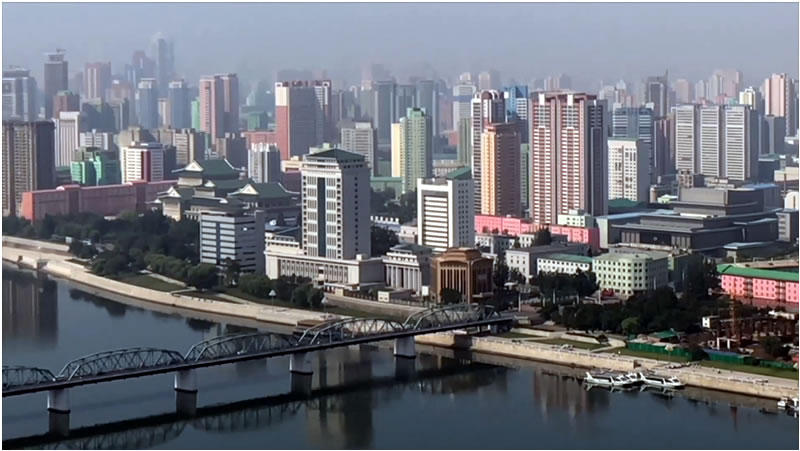
A modern landscape of Pyongyang (1).
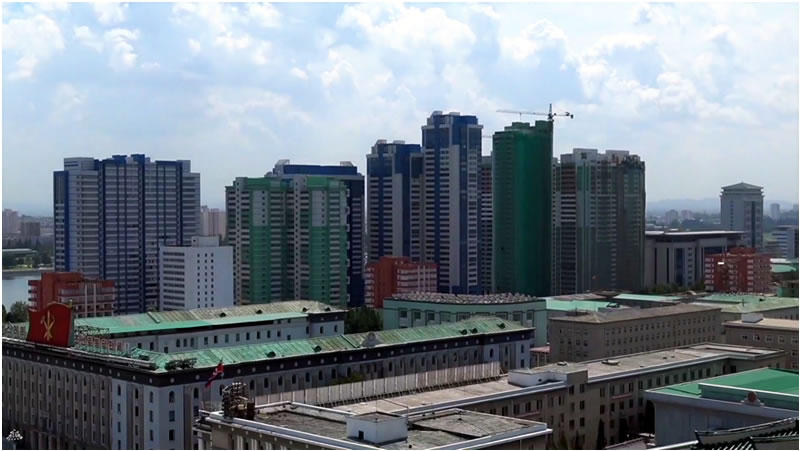
A modern landscape of Pyongyang (2).
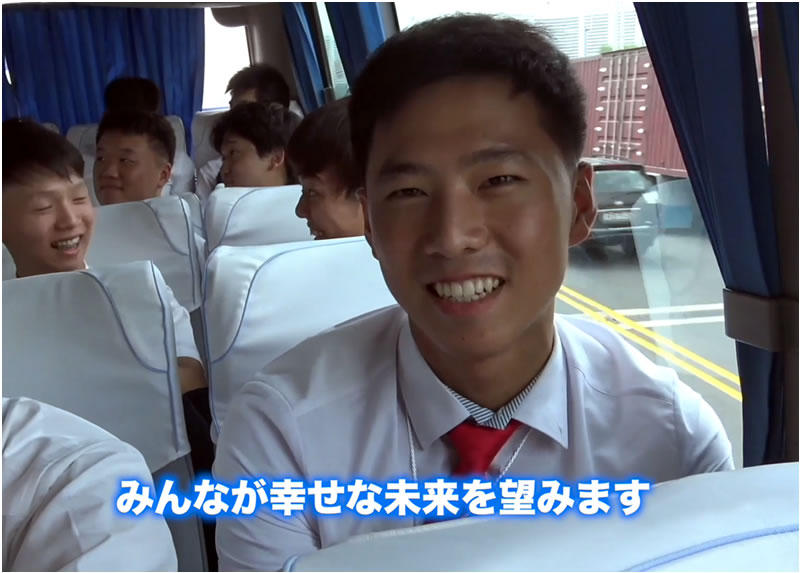
A student of the Pyongyang University of Foreign Studies answered the question, “What kind of future do you want to have?” His answer was: I would like to have a world where everybody is happy.
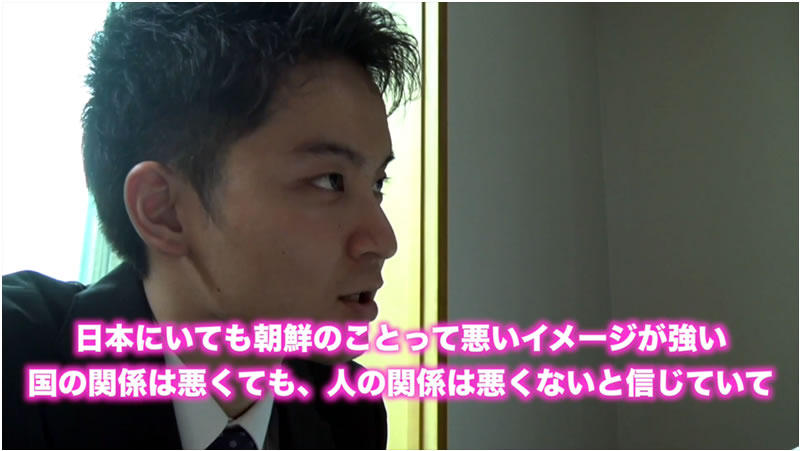
A university student of Japan talks about the importance of keeping relationships with North Korean people on the citizen level, even if the political relationship between the two countries gets worse.
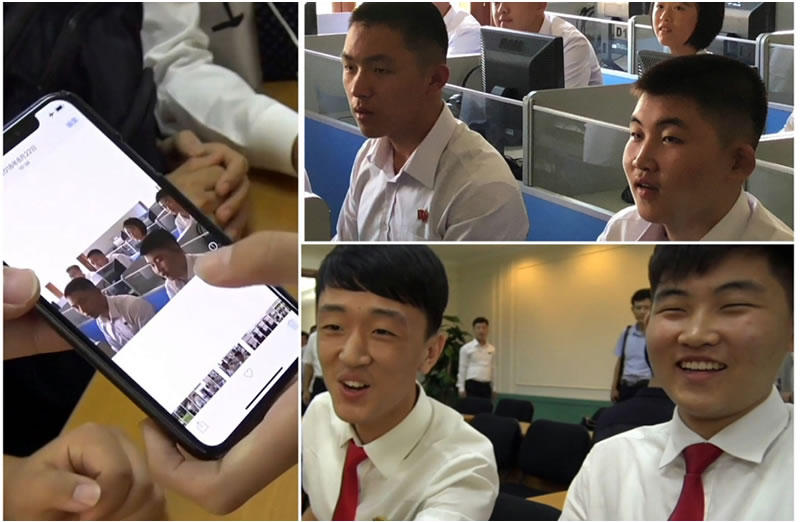
The students of Kim Il-sung University smile during the reunion with Japanese students, seeing the picture taken of last year’s reunion on a smartphone.
◉The 2nd Session
In the second session, the Japan-North Korea Exchange Program, which was featured in Morning Cross, was introduced to the participants. Imai and Mr. Hori discussed the current situation in North Korea by referring to the viewer’s comments given in the TV program.
In Morning Cross, viewers’ tweets were shown in the subtitles in real time. Since the tweets were randomly selected, some of them held negative opinions of the program. For example,
Why should we have to know about North Korea?
It’s like a theme park named Pyongyang.
“I don’t think the people in North Korea that appeared in the movie are giving honest opinions, given the character of the South Korean people.”
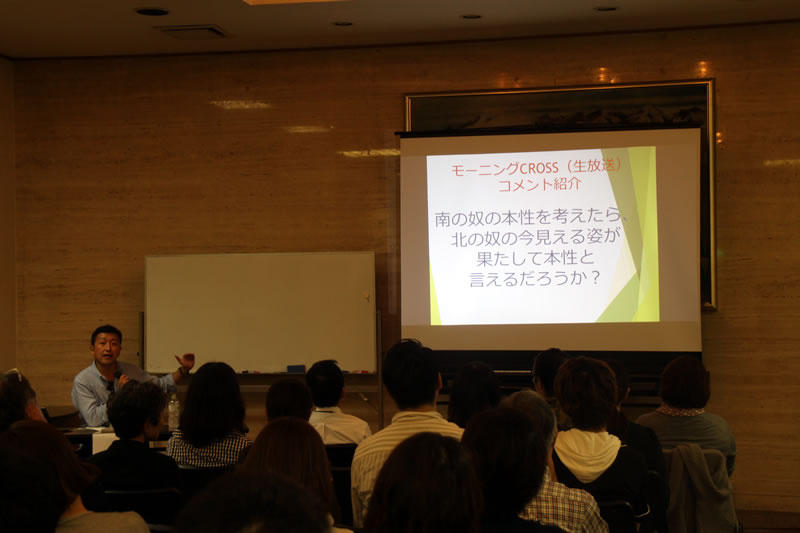
Discussion about the tweeted comments.
Based on these comments, we had casual discussions. I will introduce some of them below. Such viewpoints could be obtained by only those who visited North Korea.
◉Can we understand North Korea through visiting only Pyongyang?
We often hear this kind of opinion. Let’s see how Mr. Hori and Mr. Imai responded.
I believe the first step toward mutual understanding is to directly express our honest opinions to the North Korean people. It is true that we have no idea about the life of local people in rural or residential areas. To understand the life in those areas, we need 10 more years or so. I found that some students had a reunion in this event, and it suggests to us that we can deepen our relationship with time and learn more about each other. I will report more details about the real life in such areas in the near future. (Hori)
Some of the graduates of the Pyongyang University of Foreign Studies that attended the Japan-North Korea Exchange Program were recently employed by the Ministry of Foreign Affairs of North Korea. Since they studied Japanese, they will probably take charge of Japanese affairs in the ministry. In the long run, it is very important to maintain good friendships with these young people and help them understand Japan as it is. (Imai)
Pyongyang is a wealthy area where rich people live, and the participating students are also from an elite school. We know we cannot grasp the real life of North Korean people by visiting only Pyongyang. However, the North Korean people whom we are contacting in the exchange program may have power and influence on the relationship between Japan and North Korea in the future. Therefore, this is a very important opportunity to exchange our opinions with them.
◉Are we really exchanging our true opinions in that program?
The following are some of the tweets sent to Morning Cross.
Can students in Pyongyang criticize Kim Jong-un?
It is great to have a relationship with North Korean students, but we only see the bright side of North Korea, which is artificially created by the government for propaganda.
It is true that North Korean people don’t seem to express their honest opinions as we see in the news programs about North Korea. So, we are not sure whether the students in Pyongyang told us their honest opinions in the exchange program.
In response to these questions, Imai answered as follows.
Students held deep discussions during the program, and they are getting deeper and deeper every year.
Adults often avoid expressing their honest opinions, but the young students don’t worry about it and express their honest opinions, especially with youth of the same generation.
For example, a student of the Pyongyang University of Foreign Studies strongly insisted in a workshop that Japan should compensate for the damages to North Korea that Japan caused during wartime. In response, a Japanese student raised the importance of the abduction issue and replied, “I heard that the North Korean government recently returned the alleged bones of these people to Japan, but the DNA tests proved that these bones were fakes or of another person’s. Are you aware of this issue?” These kinds of straightforward talks might not be possible for adults. In fact, some adults around the young students broke out in a cold sweat. Fortunately, the North Korean student replied in a calm manner, saying that he did not know about the fake bones. The Japanese student also replied that he did not know the importance of the liability problem in wartime. Straightforward talks about sensitive topics could result in emotional arguments. However, it turned out that both students were smart and cool enough to appreciate their having opportunities to learn from each other.
Mr. Hori also discussed the importance of continuing dialogue. “The more you meet with each other, the deeper your relationship will become and the more honestly you can speak with each other from your heart. There were two Japanese students that attended this program for two consecutive years. It was a good chance for them to talk with the same North Korean students this year. They spoke in a relaxed mood and more honestly than last year. We can make such deep bonds with friends of any country, if we meet repeatedly.”
◉What is necessary for building healthy and balanced public opinion toward North Korea?
How should we respond to the ingrained prejudice toward North Korea as shown in the viewers’ tweets? What kind of approach is necessary for getting rid of disgust?
Mr. Hori emphasized the importance of exchanging honest opinions with each other. In his TV programs, such as news programs of NHK that he was previously involved with or Morning Cross that he currently takes charge of, he always delivers real and honest opinions of TV viewers. He believes that the style of his TV programs exposes us to critical and unexpected opinions that eventually create opportunities to exchange opinions. He summarized his policy as such, “I don’t like one-way communication from the production to viewers in my TV programs. I welcome objections from viewers and would like to establish a two-way relationship.”
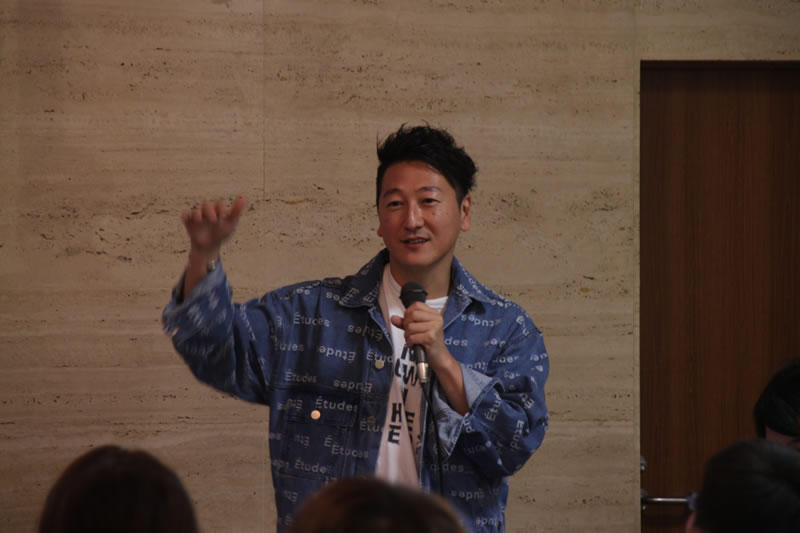
Mr. Hori speaks with the audience.
◉After the Event
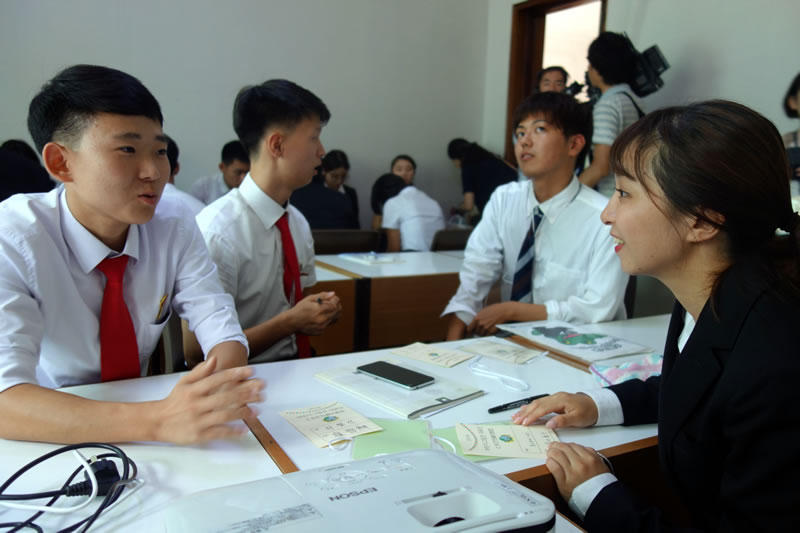
Direct communication helps them understanding each other more deeply.
We don’t know whether the media gives correct information regarding North Korea or not. We may correctly understand North Korea, if we go there and watch everything with our own eyes, but it’s difficult. On the other hand, if we accept all the news from the media as it is, we are overwhelmed by it, feel fear, and start suspecting the country. That’s the reason I think that we must keep thinking for ourselves based on available information and try finding the truth.
I confirmed in this event that it is important to look closely at individual life rather than the whole nation. Before I started working as an intern of JVC, I had a negative impression about North Korea. However, after knowing the life of local people and their opinions, my impression has changed. For example, a North Korean student said, “I didn’t know that neighboring countries are scared by the launching of missiles by North Korea. I thought that any country did the same thing for self-defense. To me the US military bases in Japan and the Japan Self-Defense Forces are more frightening.” This kind of opinion can only be obtained when we directly communicate with the individuals of North Korea. If we understand such viewpoints, we will have more options for approaching mutual understanding.
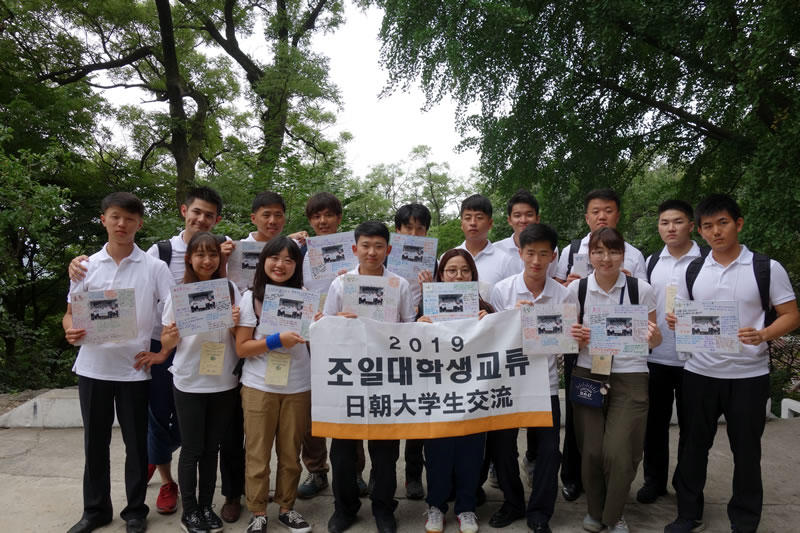
Participants of the 2019 Japan-North Korea Exchange Program.
Thanks for reading through this article. In winter 2020, the Japanese students that attended the 2019 program will hold an event to report about it. Please check the update on our JVC website!
Share This: